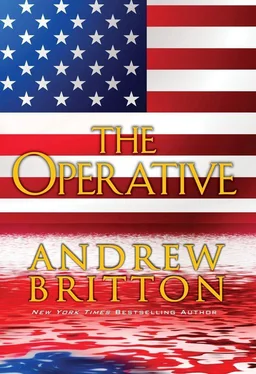Andrew Britton - The Operative
Здесь есть возможность читать онлайн «Andrew Britton - The Operative» весь текст электронной книги совершенно бесплатно (целиком полную версию без сокращений). В некоторых случаях можно слушать аудио, скачать через торрент в формате fb2 и присутствует краткое содержание. Жанр: Триллер, на английском языке. Описание произведения, (предисловие) а так же отзывы посетителей доступны на портале библиотеки ЛибКат.
- Название:The Operative
- Автор:
- Жанр:
- Год:неизвестен
- ISBN:нет данных
- Рейтинг книги:5 / 5. Голосов: 1
-
Избранное:Добавить в избранное
- Отзывы:
-
Ваша оценка:
- 100
- 1
- 2
- 3
- 4
- 5
The Operative: краткое содержание, описание и аннотация
Предлагаем к чтению аннотацию, описание, краткое содержание или предисловие (зависит от того, что написал сам автор книги «The Operative»). Если вы не нашли необходимую информацию о книге — напишите в комментариях, мы постараемся отыскать её.
The Operative — читать онлайн бесплатно полную книгу (весь текст) целиком
Ниже представлен текст книги, разбитый по страницам. Система сохранения места последней прочитанной страницы, позволяет с удобством читать онлайн бесплатно книгу «The Operative», без необходимости каждый раз заново искать на чём Вы остановились. Поставьте закладку, и сможете в любой момент перейти на страницу, на которой закончили чтение.
Интервал:
Закладка:
“Agent Bishop was with his daughter at the convention center,” Cluzot said. “She was killed in the explosion.”
The words hung like a toxic cloud. Kealey actually felt sick. Andrews saved him.
“Who’s spoken with Agent Bishop?” he asked.
“I did.” Cluzot raised a hand. “He flew back with the special agent in charge up there, who will be briefing me about ongoing operations”-he popped the pocket watch he carried-“at midnight.”
“Does the SAC know why Bishop was summoned?” Andrews asked.
“Courtesy to a brother who has suffered a loss,” Cluzot replied. “That’s all.”
As he was speaking, both the phone on the president’s desk and the FBI director’s cell beeped. They exchanged looks. Kealey knew why. They were probably getting the same message. He was guessing it wasn’t good.
Cluzot rose from the sofa and walked to the recessed door. The president picked up. They listened without comment to whatever was being said. The room was like church, full of purposeful silence.
The calls finished at nearly the same time. Cluzot deferred to the president.
“New York?” Brenneman asked him.
“Yes, sir,” the FBI director replied.
“Go ahead,” the president said. He sat back in his leather chair, looking reflective and disgusted, like someone who just wanted to push every damn thing off the table.
Cluzot took a long breath. This was obviously personal to him. “Franklin May, our assistant director of the DI, was found beaten to death on a Manhattan street,” the director said gravely. “It appears to have been the work of a homeless man, but the NYPD is investigating.”
“Was the AD on assignment at that location?” Andrews asked.
“He was checking the progress of psyops research,” Cluzot replied. “It happened near Battery Park, less than a block away from our lab.” He regarded Brenneman. “If you’ll excuse me, Mr. President, I’d like to see what our people down there know. The NYPD is asking.”
“Of course,” Brenneman replied. “Use my study.”
“Thank you, sir.”
Cluzot made his way to the door between the fireplace and the main entrance. This was where presidents went for breakaway talks during meetings, to smoke, or to meet clandestinely for reasons that were rarely discussed on the outside. The FBI director did not shut the door behind him but walked toward the dining area beyond the study. No one said what was on the unhappy faces and busily working minds of everyone present, that this was somehow related to the events of the day. Everyone slipped into reflection while they waited for Cluzot. Only the press secretary seemed fully present. That was understandable. She was listening carefully to everything that was said. When standing before the press corps, it was just as important to know what not to say as it was what to say.
“How’s everyone holding up?” the president asked. The question seemed calculated more to break the silence than to pump up energy levels.
There were indecipherable murmurs and vague nods.
“Would anyone like-where are we? — dinner or breakfast?” he asked, gesturing to a small table that had been set up on the other side of the desk.
There were insincere chuckles. It didn’t look as though anything had been touched, other than the coffee. There were half-emptied cups on the coffee table between the sofas. The Oval Office attendees had been too tired, too shell-shocked, too focused to think about eating.
The president went over, poured himself coffee from an antique coffee pot, and selected half a turkey sandwich. He sat on the corner of his desk and held the plate while he ate.
“I’ll be meeting with the Joint Chiefs at one a.m.,” Brenneman said. He lofted the coffee as if he were making a toast.
“That stuff ’ll float a horseshoe, Mr. President,” Carlson remarked.
“That’s what I need,” the president replied. “I don’t think that meeting will be brief.”
The chuckles were even less enthusiastic now.
The president didn’t have to explain to this group what Admiral Breen was doing. The Office of the Chairman of the Joint Chiefs would be collating its own satellite data, phone intercepts, and reports from international intelligence teams, all of which were being funneled through Homeland Security. If they came up with anything that showed the attacks were rooted somewhere overseas, they were going to have to respond. The best-case scenario was a city in an allied nation, like Germany or England. Arrests could be made there, with no attacks. If it turned out the terrorists had plotted in a hostile nation, that nation would be bombed.
That was informally referred to as the Kissinger Mandate, and Kealey agreed with it. In the hours after the September 11 attacks, the former secretary of state was the first official to go on record saying that a military target must be found and hit. That was necessary not only for the psyche of the nation but also to show the enemy that they couldn’t bloody our nose and get away with it. Not in the short term, and certainly not in the long term. It was also a bone to the military. As an army colonel had said to Kealey after the attacks, “What the hell are they waiting for? Just send us over, with fixed bayonets, shoulder to shoulder, and let us march from one end of that goddamn country to the other.”
Cluzot returned before that could become a topic of discussion. “One of our guys walked him downstairs from the lab, pointed him in the direction of the subway, came back,” the FBI director said. He looked at notes he had made on a small notepad; he would shred those before leaving the Oval Office. “The man in question is Alexander Hunt, assistant director of the New York field office. He was the only other Bureau man on scene. Eight-year veteran, fast-track rise. Psych tagged him as an ‘aggressive patriot’ because of actions against some of his Muslim coworkers, but no other blemishes. Concierge at the building confirms that he was in and out.”
“Surveillance?” Andrews asked.
“Solid except for about a half a block, zero of the crime scene.”
That set off alarms in Kealey’s brain. In a high-security area like Lower Manhattan that kind of a precision “mugging” was just too neat to be an accident. “What do we know about the lab?”
“We are presently running twenty-nine separate R amp; D projects in psych alone,” Cluzot said. “I wasn’t following this one.”
“Who was?” the president asked.
Cluzot replied, “May and Hunt.”
“Terrific,” Press Secretary Stempel piped in.
“Andrea, the idea is to keep information contained,” Cluzot said. “That’s the strength and the weakness of these programs.”
She raised her hands defensively. “That wasn’t a knock, Mr. Director. It’s just another question I can’t answer at a press conference. Every time I say an operation is ‘classified,’ we get ten conspiracy theory sites online.”
“Well, we can’t go asking Hunt,” Kealey said. “Not until we’re sure about him. He might torch the place.”
Cluzot looked at him. He didn’t seem pleased by the suggestion.
“You said he was… What was the phrase?” Kealey asked. “An aggressive patriot? That place is about five blocks from the World Trade Center site, eight blocks from the Ground Zero mosque. That kind of proximity does things to people.”
“Agreed, but we still have to debrief him,” Andrews said.
“No argument. Recommendation?” the president asked.
“I suggest that Mr. Kealey and Mr. Bishop go up there and talk to AD Hunt and the people at Xana, that is the name of the team at the lab,” Cluzot said.
There was a short, crushing silence. Kealey had always been a Hail Mary pass, not a first responder. He wondered if things had gone farther than Cluzot was letting on.
Читать дальшеИнтервал:
Закладка:
Похожие книги на «The Operative»
Представляем Вашему вниманию похожие книги на «The Operative» списком для выбора. Мы отобрали схожую по названию и смыслу литературу в надежде предоставить читателям больше вариантов отыскать новые, интересные, ещё непрочитанные произведения.
Обсуждение, отзывы о книге «The Operative» и просто собственные мнения читателей. Оставьте ваши комментарии, напишите, что Вы думаете о произведении, его смысле или главных героях. Укажите что конкретно понравилось, а что нет, и почему Вы так считаете.












